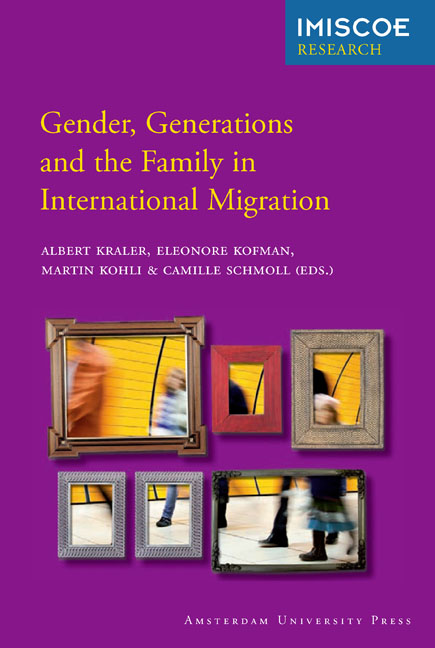Book contents
- Frontmatter
- Contents
- Preface
- 1 Introduction: Issues and Debates on Family-Related Migration and the Migrant Family: A European Perspective
- Section I The Family as a Moral and Social Order
- Section II Gender, Generation and Work in the Migrant Family
- Section III Marriage Migration and Gender Relations
- Section IV Transnational Family Lives and Practices
- List of Contributors
- Index
- Other IMISCOE titles
4 - Filial Obligations Among Immigrants and Native Dutch: A Comparison of Perceptions and Behaviour Among Ethnic Groups and Generations
Published online by Cambridge University Press: 21 January 2021
- Frontmatter
- Contents
- Preface
- 1 Introduction: Issues and Debates on Family-Related Migration and the Migrant Family: A European Perspective
- Section I The Family as a Moral and Social Order
- Section II Gender, Generation and Work in the Migrant Family
- Section III Marriage Migration and Gender Relations
- Section IV Transnational Family Lives and Practices
- List of Contributors
- Index
- Other IMISCOE titles
Summary
Introduction
Filial obligation, both perceptions and behaviour thereof, are often supposed to differ across ethnic groups. Immigrants from non-Western countries are supposed to originate from, and be part of, family systems that have strong interdependent ties and obligations compared to natives in the host society (Bolzman, Poncioni-Derigo, Vial & Fibbi 2004; Reher 1998). How and to what extent the immigration experience affects perceptions and behaviour regarding filial obligations is still rather unexplored. The literature is contradictory on the importance of ethnic background for filial obligations. Some North American studies show that expectations parents have towards their children indeed differ by ethnic group (Burr & Mutchler 1999; Lee, Peek & Coward 1994; Rosenthal 1986). Other studies, however, point to the fact that inter-ethnic differences are the result of differences in demographic characteristics and socio-economic position between natives and immigrants (Glick & Van Hook 2002; Mitchell, Wister & Gee 2004; Sarkisian, Gerena & Gerstel 2007). Differences in family relations across ethnic groups may thus not be as large as assumed and may be partially explained by socio-economic position (Silverstein & Waite 1993; Schans & Komter 2006). De Valk and Schans (2008) found that older immigrants, especially, have higher filial obligation expectations than their Dutch counterparts, but few studies have examined both perceptions of filial obligation and actual support behaviour, nor has the importance of perceptions for behaviour received much attention yet.
In addition, the available research focuses on North America, and much less is known on how these compare to the European situation. Given the provision of welfare state arrangements in many European societies like the Netherlands, one could assume that perceptions and behaviour regarding care for the elderly are different from those societies in which the state offers only very limited support to families in this respect. The importance of ethnic characteristics for filial obligations may thus vary according to the social context (Baldassar 2008). Getting more advanced insights into the determinants of filial obligations of immigrants and their offspring is also of societal relevance now that a substantial and growing proportion of the elderly in many Western countries has an immigrant origin.
- Type
- Chapter
- Information
- Publisher: Amsterdam University PressPrint publication year: 2012
- 3
- Cited by

